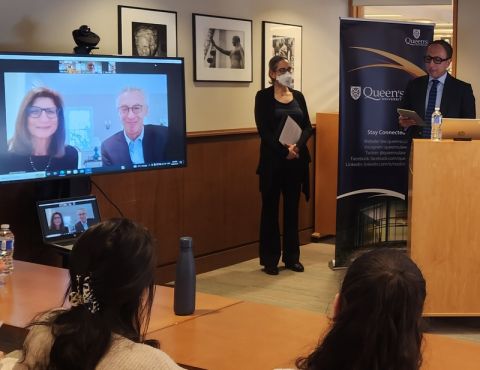
A compelling presentation on “Democracy, Equality, and Reproductive Justice: Abortion and Beyond” raised as many questions as it answered at the recent, inaugural Marcus-Matalon Lecture on U.S. Law. The guest speaker was Serena Mayeri, professor of law and history at the University of Pennsylvania.
In his welcoming comments, Associate Dean (Academic Policy) Mohamed Khimji, thanked co-sponsors Stephen Marcus, Law ’77, of the Marcus Firm PLLC and his wife, Renee Matalon, a Harvard Law’81graduate, for their generosity in funding the five-year series.
Speaking via Zoom, Marcus noted the purpose of the lecture series is to provide insights into important U.S. legal and constitutional issues of interest to Canadian law students, and which may have implications for the Canadian legal system. “It’s also intended to help students develop a basic understanding of the U.S. legal system, which will be useful to them as practicing lawyers working in a trans-national and global environment,” he said, adding: “Today’s topic is an ideal subject for this inaugural lecture.”
Introducing the speaker, Marcus said, “Canada and the U.S. share many constitutional values, including the constitutional right of equal protection under the law. Professor Mayeri is an expert on the EP clause in the U.S. constitution and has argued that it protects a woman’s right to an abortion.”
At the outset, Mayeri indicated she would address abortion rights in a larger context than the Supreme Court’s landmark overturning of Roe v. Wade in Dobbs v. Jackson Women's Health Organization last year. Tracing the history of the anti-abortion movement back to the 1850s – “when anti-abortion physicians argued that abortion restriction was necessary to preserve white racial dominance and fulfill women’s maternal destiny” – she described how, over the intervening years, Republican strategists came to see that abortion issues could propel voters to support a much wider conservative legal and political agenda.
“For the conservative legal movement, ending abortion is a means to other ends, and not merely an end in itself,” Mayeri argued. “There’s a whole other set of issues – like gun control, health insurance, environmental protection, voting rights, employment and labour protection, equality based on sexual orientation, and more – that is being pulled along, in part, by issues like abortion.”
The abortion rights movement can also be viewed as part of a larger agenda: one of reproductive justice and equality, Mayeri continued. “Abortion restrictions have a dramatic racially and economically disparate impact,” she said. “Women of colour are more likely to seek abortions for a variety of reasons, but poverty is high among them. Abortion restrictions exacerbate pre-existing economic and health-related disparities.”
Nowhere is this more evident than in Mississippi, where the Dobbs litigation originated, said Mayeri.
While the majority opinion stated that abortion is not a fundamental right under the U.S. constitution, overruling almost 50 years of precedent, the three dissenting judges provided “a very powerful and eloquent” counter-argument, she said. They cited the devastating impact on women’s equal citizenship and equal status, enabling the coercion and criminalization of people based disproportionately on their colour and economic status.
Warning that the decision leaves open several thorny legal questions regarding reproductive health care, Mayeri suggested, “The threat to other human rights is also very real. Abortion is only the tip of the iceberg … It is part of a larger attack on democracy and the rule of law.”
She added, however: “There is room to see opportunities to build a more expansive and capacious agenda for reproductive justice that could go far beyond what Roe v. Wade and Planned Parenthood v. Casey ever protected.”
After ending on that positive note, Mayeri addressed questions from the audience, ranging from her reaction to the “outlandish” majority opinion in Dobbs; to the potential impact of the U.S. Supreme Court’s newest member, Justice Ketanji Brown Jackson; to whether access to abortion could be argued as a religious freedom right (it could, and has).
At its conclusion, Dean Mark Walters invited audience members to chat further, informally, with Professor Mayeri and thanked both speaker and donors for a successful inaugural event.
By Nancy Dorrance